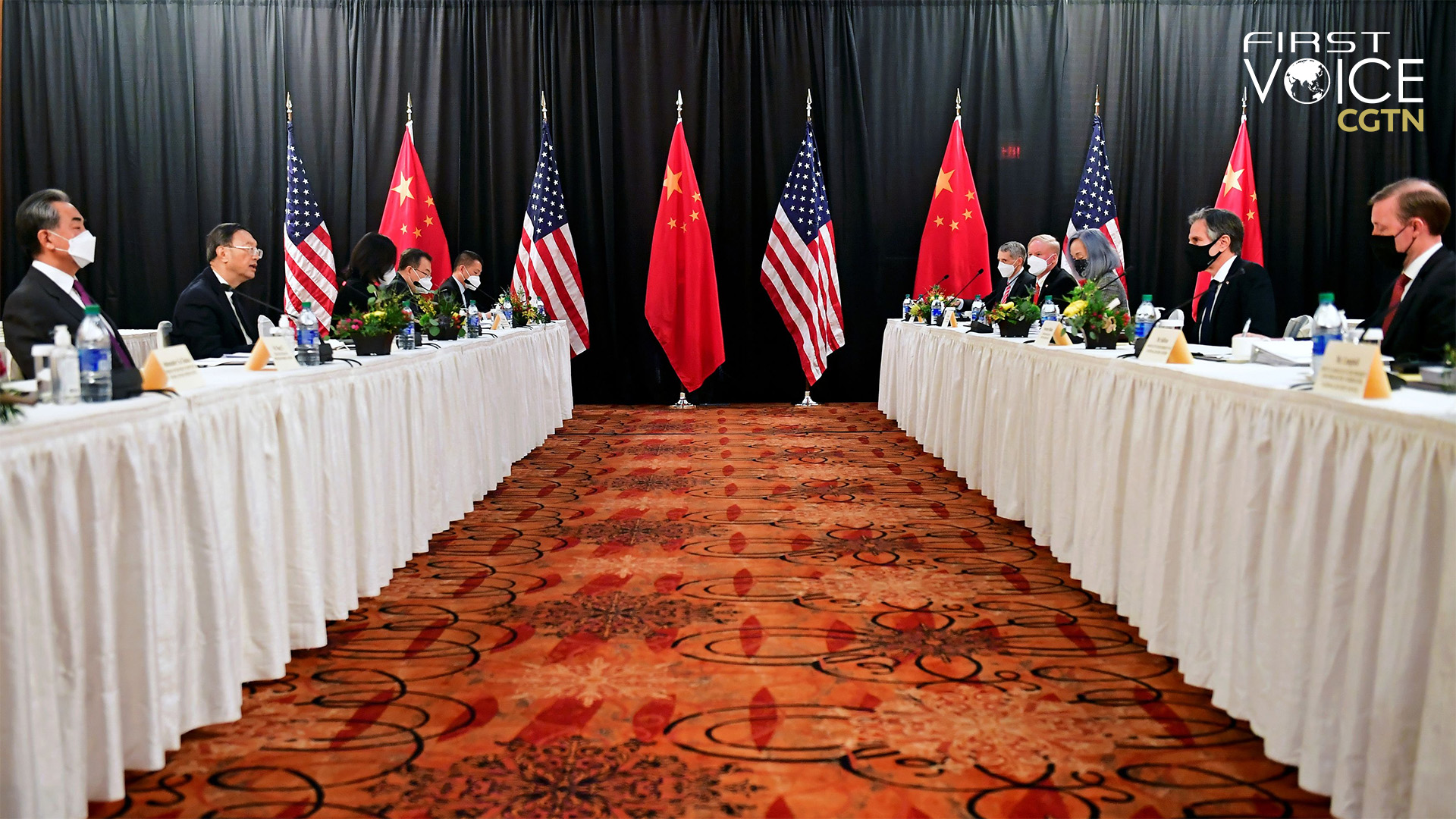
Editor's note: CGTN's First Voice provides instant commentary on breaking stories. The daily column clarifies emerging issues and better defines the news agenda, offering a Chinese perspective on the latest global events.
Before the China-U.S. strategic dialogue kicked off in Anchorage, Alaska, Chinese Ambassador to the United States Cui Tiankai said: "For any dialogue between countries, a basic prerequisite is that both sides should have the spirit of equality and mutual respect."
A pretty straightforward statement which, given the fiery opening of the first day of meeting in Anchorage, clearly wasn't taken to heart by the U.S. delegation.
When Chinese top diplomat Yang Jiechi and Foreign Minister Wang Yi sat down with U.S. Secretary of State Anthony Blinken and National Security Advisor Jake Sullivan on March 18, what the Chinese delegation faced was something akin to what China has faced over the past couple of weeks – accusations, tough talks and aggressive rhetoric about how China has wronged the world.
The Cold War mentality advocated by the previous administration was dangerous, destabilizing and destructive. The Biden administration, given all its talks about re-engaging with the world and optimistic rhetoric, shouldn't be double-faced when it comes to China. China's strength isn't U.S.' justification to hurl accusations and China's confidence isn't U.S.' excuse to break diplomatic protocols.
It is understandable that Biden's people need to project a "tough on China" image back to its domestic audience in America. The administration has by-and-large been boxed into this approach by the Trump administration's policies. The "conventional wisdom" in Washington D.C. nowadays is that engagement with China is more zero-sum that rely on compromising America's national interest and China ought to be treated as an adversary as opposed to a partner. Biden has found little political space to shift from this. The "price" of engaging in dialogue with China is considerably high. Tough talk could be Biden's way to appeal to the power-holders back at home.

The view of 4th Avenue, the main commercial venue in Anchorage, Alaska, U.S. /Getty
The view of 4th Avenue, the main commercial venue in Anchorage, Alaska, U.S. /Getty
The administration should (and probably is) aware that this is dangerous. As much as diplomacy is about what is said behind closed doors, what's said openly is equally important. China is not going to compromise on its "core interests" or sit-by and take assaults on its values without reciprocating.
Still, two countries bear many common interests and dialogues shouldn't be just for trading barbs. If not, why have any dialogue at all? Despite the way America has gone into this meeting, there must be something for them to gain from it in tandem with China.
America should understand that China does not seek to threaten or challenge the international order. Contrary to Blinken's characterization, China's interests are vested in maintaining and improving the current global system. China does not seek hegemony nor does it seek confrontation or conflict against America.
Neither is China looking to compromise on its core interests in return for U.S. concessions or reconciliation. Just because Blinken and the U.S. feel a need to express their opinions on matters like Hong Kong election improvement or Taiwan, it doesn't mean they are qualified to have a say. These are China's internal affairs. It is not within the U.S. Secretary of States' purview or authority to direct how Chinese government should conduct its domestic policies. Hammering sanctions left and right wouldn't make China budge. And they only pile on even more animosity between the two countries when they are imposed on the eve of the strategic dialogue.
As Chinese Foreign Minister Wang Yi said, this is not the way to welcome guests.
This high-level official strategic dialogue is a perfect venue for spending time discussing common purposes that both countries could contribute, it is not for listening to condescending remarks or rehearsed insults. Climate change, global non-nuclear proliferation, counter-terrorism and managing this vast economic relationship as opposed to simply trying to destroy it are what the two countries and the world are looking for a resolution on. China is ready to negotiate in good-faith as long as the sincerity is reciprocated.
But, is Washington ready? Given what happened on the first day, renewing the stability wouldn't be an easy task. But it is one worth committing to given what is at stake. Washington should take the time to look at the bigger picture. This strategic dialogue in Alaska is not for posturing, it must be a place where the foundation for the future China-U.S. relationship is laid.
(If you want to contribute and have specific expertise, please contact us at opinions@cgtn.com.)

